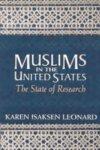
Book Summary
As the United States wages war on terrorism, the country's attention is riveted on the Muslim world as never before. While many cursory press accounts dealing with Muslims in the United States have been published since 9/11, few people are aware of the wealth of scholarly research already available on the American Islamic population. In Muslims in the United States, Karen Isaksen Leonard mines this rich vein of research to provide a fascinating overview of the history and contemporary situation of American Muslim communities. Leonard describes how Islam, never a monolithic religion, has inevitably been shaped by its experience on American soil. American Muslims are a religious minority, and arbiters of Islamic cultural values and jurisprudence must operate within the framework of America's secular social and legal codes, while coping with the ethnic differences among Muslim groups that have long divided their communities. Arab Muslims tend to dominate mosque functions and teaching Arabic and the Qur'an, whereas South Asian Muslims have often focused on the regional and national mobilization of Muslims around religious and political issues. By the end of the 20th century, however, many Muslim immigrants had become American citizens, prompting greater interchange among these groups and bridging some cultural differences. African American Muslims remain the most isolated group-a minority within a minority. Many African American men have converted to Islam while in prison, leading to a special concern among African American Muslims for civil and religious rights within the prison system. Leonard highlights the need to expand our knowledge of African American Muslim movements, which are often not regarded as legitimate by immigrant Muslims. Leonard explores the construction of contemporary American Muslim identities, examining such factors as gender, sexuality, race, class, and generational differences within the many smaller national origin and sectarian Muslim communities-including secular Muslims, Sufis, and fundamentalists. Muslims in the United States provides a thorough account of the impact of September 11th on the Muslim community. Before the terrorist attacks, Muslim leaders had been mostly optimistic, envisioning a growing role for Muslims in U.S. society. Afterward, despite a brave show of unity and support for the nation, Muslim organizations became more open in showing their own conflicts and divisions and more vocal in opposing militant Islamic ideologies. By providing a concise summary of significant historical and contemporary research on Muslims in the United States, this volume will become an essential resource for both the scholar and the general reader interested in understanding the diverse communities that constitute Muslim America.
Book Details
| Book Name | Muslims In The United States: The State Of Research |
| Author | Karen Isaksen Leonard |
| Publisher | Russell Sage Foundation Publications (Jul 2003) |
| ISBN | 9780871545305 |
| Pages | 199 |
| Language | English |
| Price | 881 |








